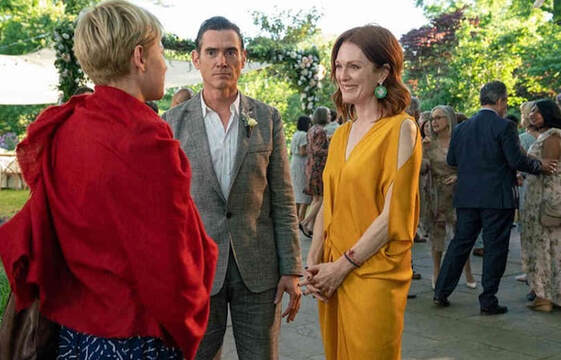|
An inordinate amount of drama happens within a week or two immediately after a wedding ceremony and celebration in the movie “After the Wedding” starring acting heavyweights Michelle Williams, Julianne Moore and Billy Crudup. Things start innocently and slowly enough as Isabel (Williams), an American manager of a struggling orphanage in Calcutta, learns that her non-profit may be the benefactor of large, ongoing donations from a corporation in New York. In order to seal the deal and secure the funding, the company explicitly needs Isabel to come in person for an interview. While Isabel is greatly relieved at the prospect of the much needed gift, she is reticent to leave her responsibilities at the orphanage, but the greater good prevails. Before long, she is in New York, put up in a swanky hotel and given an audience with the company’s CEO, Theresa (Moore) at the company’s headquarters.
From the time Isabel arrived in New York and back in Western clothing, you sense her discomfort with the setting and her situation. She clearly just wants to get in and out quickly, securing the generous grant money, and back to what has become her home and life. Being the seemingly demanding, powerful corporate executive that she is, Theresa makes it clear that she is in control of the situation, and she has other plans. Although their initial meeting is, in fact, quick, to Isabel’s dismay, it is only an initial meeting. Theresa fanes hesitancy to guarantee the orphanage’s selection, assuring Isabel that if she wants the money, she should expect a longer visit. Theresa seemingly wants to be convinced of the orphanage’s worthiness, while Isabel assumed it was a done deal. Isabel finds Theresa off-putting and demanding, questioning the true value of the grant juxtaposed against Theresa’s expectations. But until Theresa is available to meet on the matter again several days later, she insists Isabel come to her daughter’s wedding. It is while sitting in the back at the wedding, Isabel is horrified at realization of who the father of the bride is, Oscar (Cruddup). When he sees her, after the ceremony, he too is shocked and upset. The two acknowledge each other privately, sharing succinct pleasantries and questions, initially without letting Theresa or their daughter, Grace (Abby Quinn), know of their familiarity. This spark of mystery and drama turns into a flame during the wedding reception when other connections and motives are realized. Director Bart Freundich’s remake of the Danish film by the same name, switches up the gender roles in the American version, giving most of the heavy lifting to the female stars. Since Moore and Williams are two of the best actresses around, this proves to be a good choice. Seeing the two spar, so to speak, in one dramatic scene after another, proves to be the best, if not only, good aspect of the film. Williams maintains a taut unease and defiant, smoldering outrage throughout, while Moore is a more dynamic character due to unusual and unfortunate circumstances. Post-wedding, the mystery unravels rather quickly, but the pacing is achingly slow and the melodramatic twists and turns, not to mention, monologues and dialogues, are more tedious than necessarily intriguing. Too many revelations within such a short time frame, combined with a lack of character development for any of the principals, make for almost absurd drama. The character of Theresa comes the closest to being somewhat sympathetic and interesting, but only just. Crudup and Williams on the other hand, play it flat pretty much throughout, and Grace is spoiled, annoying and truly an underdeveloped character. In other words, “After the Wedding” is a dramatic bore, with a misappropriation of great talent. This maybe would have been more appropriately adapted as a mini series, giving space for the story to breathe, characters to grow, and the audience to connect. Instead we’re left with an odd and unfortunate combination of too much, too little, too slow and too dull.
0 Comments
Leave a Reply. |
AuthorPaula Farmer. Archives
June 2024
Film |

 RSS Feed
RSS Feed